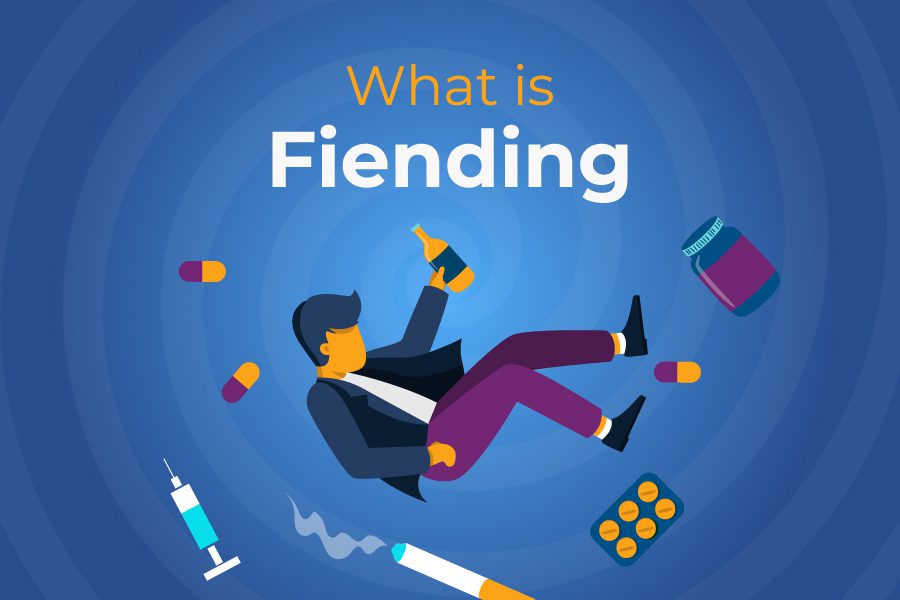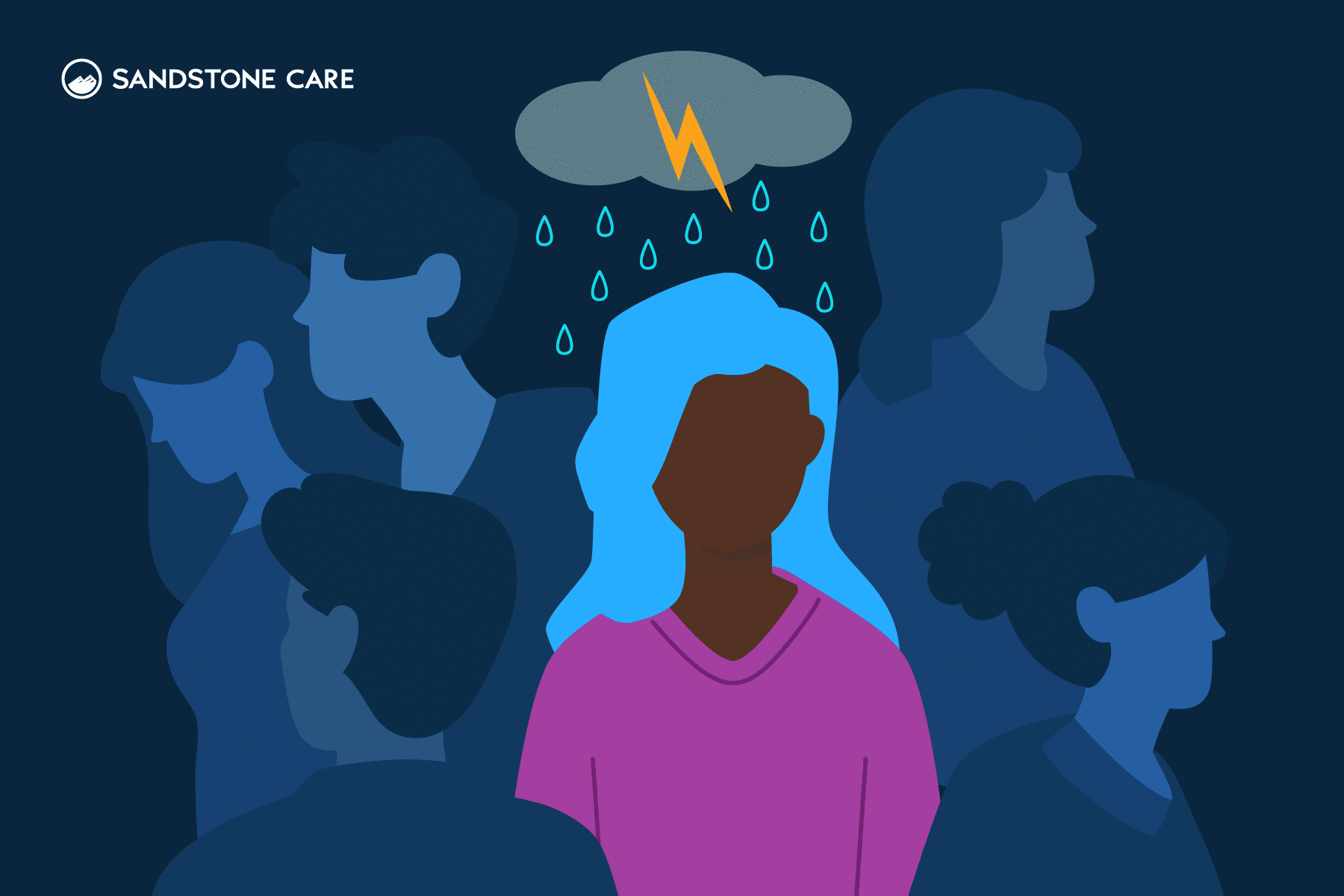Fiending Meaning
What Does Drug Fiending Mean?
Fiending is a slang term that refers to someone having an intense craving for a particular drug. It is often used to describe physical signs of addiction that can be seen by other people, like rocking, twitching, or rolling their eyes.
Someone who is “fiending” likely has a drug addiction and spends most of their time fixated on the thought of using drugs. They may also say or do irrational things to obtain drugs, even if it leads to negative consequences for them.
“Drug feens” often show physical symptoms of substance use disorder, such as withdrawal symptoms.
If you or someone you know is struggling with substance abuse disorder, you may feel helpless, hopeless, or discouraged. You’re not alone, and our team at Sandstone Care can help.
Is It Feigning, Fiending, or Feening?
Feigning, fiending, and feening all refer to someone who is going out of their way to get drugs or alcohol. However, some researchers think that the terms may have come from different origins with slightly different meanings.
The term fiending comes from the Old English word fiend, as in monster or enemy. It is often pronounced “feen” and is sometimes written that way in casual settings. So essentially, feening is a slang version of the word fiending.
Feigning for drugs, on the other hand, is a different term. This comes from the word “feign”, meaning to lie. It usually means someone is lying about symptoms or health issues in order to get a prescription drug.
Since both of these meanings end up referencing a person who is fixated on getting drugs at any cost, they are often used interchangeably.
Where Did the Term Fiending for Drugs Come From?
The term fiending for drugs comes from the late 1800s, when the word for enemy, “fiend,” began to be used to describe people who were overly obsessed with certain substances.
While the term “fiend” to mean enemy or thief has been around since old english, the etymology of the drug term started when speakers used it to describe people who took advantage of things like opioids, alcohol, even free lunches!
As time went on, fiending became a common slang term used to refer to someone experiencing an uncontrollable urge to abuse drugs.
Does Fiending Mean Someone Is an Addict?
If the context the word is being used in refers to someone’s intense craving for a drug, then yes, the person is most likely struggling with addiction.
Drug abuse is often followed by a loss of self control, which is a huge part of the definition of “fiending.”
What Is a Synonym for Drug Fiend?
Some synonyms for drug fiend could include someone with a substance use disorder, a dependent individual, or a person struggling with addiction.
Some other synonyms for someone experiencing a physical dependence on drugs that could contribute to a negative stigma include junkie, addict, or drug fiend.
Signs of Fiending for Drugs
What Are the Signs of Fiending for Drugs?
The signs of fiending for drugs involve having an intense urge or craving for a particular drug, such as shaking, twitching, scratching or picking at their skin, or rocking back and forth.
The specific signs of drug cravings can vary depending upon the particular substance the person has an addiction to. However, there are some common signs to look out for. There are psychological, behavioral, and physical symptoms to be aware of.
Some psychological symptoms of feening may include:
- An intense craving for a certain drug
- A mental fixation on how to get or use a certain substance
- Anxiety
- Depression
- Irritability
- Trouble focusing
- Feeling on edge
- Panic attacks
- Emotional instability
Some behavioral symptoms of feening may include:
- Risky or dangerous actions
- Manipulating others or lying to get money to get a certain substance
- Struggling to keep up with personal or professional responsibilities
- Withdrawing from family members and friends
- Missing work or school
- Not keeping up with personal hygiene
- Struggling to keep up with housework/cleaning
- No longer seeming interested in the hobbies they once enjoyed
- Struggling financially
- Asking to borrow money
- Frequenting locations where drug sales likely take place
- Impulsive or erratic behavior
Some physical symptoms of feening may include:
- Tremors
- Shaking
- Muscle aches or tension
- Fatigue
- Insomnia
- Rapid heart rate
- Change in blood pressure
- Dilated or pinpoint pupils
- Sweating
- Nausea
- Vomiting
- Changes in appetite
- Skin issues
- Changes in breathing
- Dry mouth
Withdrawal symptoms related to certain kinds of drug use can be dangerous and possibly even fatal. This is why you should always reach out to a doctor before going through detox.
What Does Feening Feel Like?
Feening can feel like being trapped, possessed, and physically ill. When someone is at this stage of addiction, it is difficult to think about anything other than getting the “next hit.” Some people struggling with drug addiction have described it as a “prison where everyone is staring at you lose control, over and over again.”
When someone is feening for a certain substance, they can have a hard time thinking or caring about anything else other than getting and using that drug. Their behavior may seem off, and they may appear less patient and more irritable than usual.
Can You Tell When Someone Else Is Drug Fiending?
In some cases, you can tell when someone else is feening for drugs based on their behavior or certain physical signs, especially if you know the person well.
However, in other cases, someone may be able to hide the fact that they are experiencing this, and there may be no noticeable signs that others can pick up on. People who have struggled with drug addiction for a long time may have gotten skilled at hiding their symptoms from others.
What Is a Fiend for Nicotine?
A fiend for nicotine is someone who is obsessively craving nicotine and can’t function without it.
This person may constantly talk or think about using a substance with nicotine in it, such as cigarettes, cigars, or certain vapes. They may constantly be asking if people around them have a cigarette or other nicotine product.
They may have trouble concentrating and experience certain withdrawal symptoms when they don’t have access to nicotine. This person may attempt to cut back or quit their use of nicotine but struggle to do so.
Certain withdrawal symptoms that someone who is craving nicotine may have include:
- Anxiety
- Mood Swings
- Headaches
- Irritability
- Changes in appetite
What Does a Dope Fiend Look Like?
There may be certain physical, mental, or behavioral symptoms that can help identify someone who is a dope fiend. This can include things like withdrawal symptoms, poor hygiene, mood swings, financial issues, and tremors or shaking.
What Does a Crack Fiend Act Like?
A crack fiend may take part in obsessive or compulsive behaviors, struggle to keep up with their personal or professional obligations, seem paranoid or suspicious, and isolate themselves from other people.
Someone who is struggling with a crack addiction may also experience things like anxiety, mood swings, and depression. They will experience intense cravings for crack and withdrawal symptoms when they are not able to obtain and use the drug.
It is also common for those struggling with crack addiction to experience noticeable weight loss and appear weak.
They may also struggle with financial instability and ask to borrow money. It could be hard for them to get or hold on to a stable job. They may resort to desperate and possibly risky behaviors to get access to crack.
Effects of Drug Fiending
What Are the Effects of Drug Fiending?
Many of the effects of drug fiending include struggling to have relationships, consistently losing jobs, and getting angry quickly. The specific effects of drug fiending depend on the particular drug that the person is craving but can include physical symptoms and poor mental well-being.
It can include health issues, cognitive impairment, and risk of overdose or death.
Does Fiending Make You Addicted to Drugs?
If you’re experiencing obsessive urges or cravings to use a certain drug, then yes, it is likely that you are addicted to that drug.
Can Fiending Get You Killed?
Yes, fiending for drugs can lead to an increased risk of overdose and death. The more desperate you are to get access to a drug, the more likely you are to put yourself in dangerous situations.
There’s also the chance that while you’re under the influence of a certain drug, you could take part in risky behaviors that you normally wouldn’t. This can put you at greater risk of getting hurt or killed.
How to Stop Fiending for Drugs
How Do I Stop Fiending for Drugs?
You can stop fiending for drugs by seeking professional help, going through treatment, surrounding yourself with a strong support system, and continuing to work with a therapist to prevent relapse.
Recognizing and accepting the fact that you have a problem is the first step in working towards addressing addiction. This takes a lot of courage. The next step is asking for help.
Asking for help can look different from person to person. For some people, it may be reaching out to a trusted friend or family member. For others, it may be for talking to a doctor, therapist, or an addiction treatment specialist.
This step may also include going to a 12-step-support group meeting. There, you can help from people who understand what you’re going through. Continuing to attend these meetings will likely be an important and regular part of your recovery later on.
The next step of the recovery process is going through detox. During this period, you’ll completely stop using the substance you’re struggling with an addiction to.
The detox process can be associated with symptoms of withdrawal. This is why going through the detox process in a medically supervised environment like a rehabilitation center is often recommended. While at a facility like this, medical staff can monitor your symptoms and help you manage them.
Going through detox in a medically supervised environment is often considered the safest and most effective option. This is because certain health issues can occur during this process. If this happens in a medically supervised environment, a doctor can step in as needed.
After the detox process is complete, you will then need to continue with your recovery journey. This involves seeking mental health treatment. A therapist can help you to identify the root cause of your addiction and what your triggers are.
The root cause of addiction is different from person to person. For some people, it may be an undiagnosed mental health problem like anxiety or depression. For other people, it may be stressful life events, trauma, grief, relationship issues, or another issue.
Once you have identified the root cause of your addiction, you can then begin to make the necessary changes in your life to heal. Attending regular therapy sessions may be a part of your continued treatment in recovery.
It’s also important to surround yourself with a strong support system. This could include trusted family and friends, other sober individuals, and members of your 12-step support group.
Is Fiending Permanent?
No. Fiending is not permanent, even though it may feel that way. Anyone can get treatment and recover from addiction.
In recovery, the urges or compulsions to use a certain substance can be managed. As time passes, they will likely become less frequent or noticeable.
How Do I Help Someone I Love Who Is Fiending?
If someone you know is currently fiending for drugs and in active addiction, you can help them by encouraging them to seek professional help and supporting them along the way.
It can be difficult and uncomfortable to confront someone who you know is taking part in substance use. However, having an honest conversation about the problem could ultimately save the person’s life. When approaching this person, make sure to stay calm and avoid raising your voice or becoming emotional.
Share your concerns about your loved one’s behavior with them. Let them know that there is treatment available and encourage them to reach out for help. Make sure to let them know that you’re coming to them about this from a place of concern and love for them, not judgment.
There is a chance that your loved one may become angry or defensive when you approach them. They may also deny that they have a problem. If that happens, they could not yet be at a place where they can see that they are struggling with an addiction.
While this is not the response that you were hoping for, don’t let it discourage you. In the future, reach out to this person again and encourage them to seek help. At that point, they may be more willing to discuss this issue.
If your loved one does agree to get help, make sure to let them know that you’re there to support them in any way that you can. This could be with practical things like offering them a ride or even just providing a listening ear for them when they need to vent.
Remember that you can encourage your loved one to get help, but you can’t force them. This is a decision that they must make on their own.
Watching a loved one struggle with addiction can be very stressful and can take a toll emotionally. Remember to put your own needs first and make time for self-care.
What Treatment Is There for Fiending?
There are many different types of treatment for fiending and substance use disorder, including inpatient and outpatient treatment options.
At Sandstone Care, we offer a variety of treatment options depending on your specific needs and situation. In our care, you’ll be treated only with care, compassion, and respect as you go through your recovery journey. You’ll have the constant support of our talented team as you go through this process.


Let’s Take the Next Steps Together
A porn addiction is when a person cannot stop porn use, despite the negative consequences it has on their life and wellness. Sandstone Care is here to support teens and young adults with mental health and substance use disorders.





